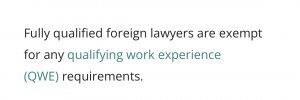Hi everyone,
I'm Sebastián, Colombian qualified Lawyer since 2017. I am currently interested in doing an LLM in order to practice as a lawyer in England in the near future. As I hold a foreign law degree I would have to follow the SQE route to practice as a solicitor. I've checked LLM Legal Practice (SQE1&2) from University of Law and Law and Legal Practice: SQE 1 Preparation Course - LLM from Nottingham Trent University.
The thing is that even if a complete one of those courses, I would need to complete two years of qualifying work experience (QWE) before to apply to be admitted as a solicitor. I know that getting work experience in England as a foreign lawyer is tough and I'm not sure if by holding one of the LLM that I mentioned, would have a good chance of getting a job as a paralegal once I finish the course.
Taking into account that I would be paying for the course myself, I just wondering if would be better pursuing an LLM General or in International Law from another university in order to apply for a paralegal position, get qualifying work experience, and then get sponsorship from a company to do SQE preparation courses and exams.
I know that I could do just a PGDL as an alternative in order to do the SQE courses but I'm interested in pursue an LLM because it could enhance my professional carrer in Colombia, which could help me in the future in case I want to return to my country, and that is why I am contemplating the idea of doing the courses I mentioned, which meet all these desires.
Could someone give me some advice on the type of course I should choose, according to my situation? I would appreciate it very much.
Thanks!!!
I'm Sebastián, Colombian qualified Lawyer since 2017. I am currently interested in doing an LLM in order to practice as a lawyer in England in the near future. As I hold a foreign law degree I would have to follow the SQE route to practice as a solicitor. I've checked LLM Legal Practice (SQE1&2) from University of Law and Law and Legal Practice: SQE 1 Preparation Course - LLM from Nottingham Trent University.
The thing is that even if a complete one of those courses, I would need to complete two years of qualifying work experience (QWE) before to apply to be admitted as a solicitor. I know that getting work experience in England as a foreign lawyer is tough and I'm not sure if by holding one of the LLM that I mentioned, would have a good chance of getting a job as a paralegal once I finish the course.
Taking into account that I would be paying for the course myself, I just wondering if would be better pursuing an LLM General or in International Law from another university in order to apply for a paralegal position, get qualifying work experience, and then get sponsorship from a company to do SQE preparation courses and exams.
I know that I could do just a PGDL as an alternative in order to do the SQE courses but I'm interested in pursue an LLM because it could enhance my professional carrer in Colombia, which could help me in the future in case I want to return to my country, and that is why I am contemplating the idea of doing the courses I mentioned, which meet all these desires.
Could someone give me some advice on the type of course I should choose, according to my situation? I would appreciate it very much.
Thanks!!!


